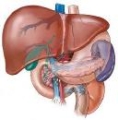|
간추출물 ( Liver Extract ) 간추출물은 그동안 미국에서 악성빈혈, 만성피로 또는 각종 바이러스 성 간염환자, 기타 간질환 환자에게 건강식품으로 상품화되어 판매되어 왔습니다. 간 추출물은 보통 돼지, 소의 간에서 지방과 콜레스테롤 등을 제거한 후 살균과정을 거쳐 냉동분말이나 농축액체 형태로 제품화되었습니다. 간 추출물은 많은 임상실험으로 그 효과 효능이 확인되었습니다. 특히 바이러스 성 간염, 또는 지방간 등 간 질환에 간 기능개선에 좋은 효과를 발휘하는 것으로 알려져 있습니다. Background Liver extract and desiccated (dried) liver have been marketed as
iron supplements for over a century. The extract is processed cow or pig
liver that may either be a freeze-dried brownish powder or a
concentrated liquid that has had most of the fat and cholesterol
removed.
Preliminary clinical studies indicate that liver extract may be helpful in treating hepatic (liver) dysfunction. In addition, liver extract seems to work synergistically with interferon in treating hepatitis C and other viral infections. More research is needed in these areas. Laboratory studies indicate that liver extract may have some effects that could be useful in treating certain forms of cancer, such as the ability to direct migration of metastasizing cells and the inhibition of DNA, RNA, and protein formation. More research is needed in these areas to quantify liver extract's properties. Some concern has been raised about the safety of liver extract, as it is made of animal liver, which may be infected with parasites, bacteria, or prion diseases. Although there are currently no available reports of diseases such as bovine spongiform encephalitis (BSE, or "mad cow disease") being transmitted by liver extract, the U. S. Food and Drug Administration (FDA) still cautions against the use of any animal organ extract. It is not clear how the processing of liver extract affects the transmission of these organisms. EvidenceTableThese uses have been tested in humans or animals. Safety and
effectiveness have not always been proven. Some of these conditions are
potentially serious, and should be evaluated by a qualified healthcare
provider.
Pernicious anemia (Grade: A) Chronic fatigue syndrome (Grade: C) Chronic hepatitis (hepatitis C) (Grade: C) Hepatic disorders (Grade: C) Surgical uses (urological operation adjunct) (Grade: C) SynonymsAlkaline phosphatase isoenzymes, aqueous liver, bovine liver
extract, crude liver extract, cyanocobalamin, hydrolyzed liver extract,
hydroxocobalamin, iron, LEx, liquid liver extract, liver, liver
concentrate, liver extract lysate, liver factors, liver fractions, liver
glandular products, liver hydrolysate, liver substance, purified liver
extract, raw liver, Solcohepsyl?, Solcohepsyl? extralysate, subcellular
liver fractions, vitamin B12.
Note: Although liver extract contains many constituents, such as vitamin B12, this monograph focuses on liver extract research. |
간 추출물 (Liver Extract)과 간질환 개선 - 요약 번역
by hsk posted Oct 15, 2009
?
Larger Font
Smaller Font
Up
Down
Go comment
Print Shortcut
PrevPrev Article
NextNext Article
ESCClose
TAG •
- Liver Extract,
- 간경화,
- 지방간,
- 간장약,



